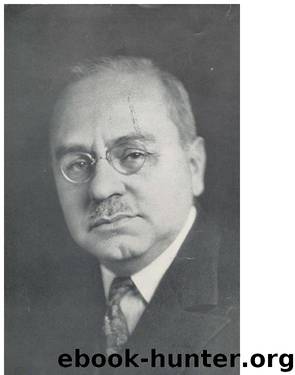Individual Psychology - Alfred Adler by Alfred Adler

Author:Alfred Adler
Language: eng
Format: epub
d. Inferiority and Superiority Complexes
COMMENT The inferiority complex is the term with which Adler’s name is most often connected, yet it was in all probability not coined by him. Used by him variously to convey three different meanings, it represents no particularly new contribution to the theory of Individual Psychology in any way commensurate with its popularity.
According to Oliver Brachfeld, Adler’s first use of the term occurred in 1926 when, “in the course of his first lecturing tour in the United States, he realized that he had been called the ‘father of the inferiority and superiority complex’ ... He had to bow to the power of this word, which he had begun by rejecting because of its definitely Freudian ring” (17, pp. 112-113 & 102). Brachfeld’s statement is supported by the fact that the first use of the term attributed to Adler is found in an interview in the New York Times in the fall of 1925 (1925). Furthermore Adler referred in 1930 to “what is called in America, under the influence of Individual Psychology, the ‘superiority complex’ . . . the outcome of the ‘inferiority complex’” (lgjod, p. 122). Later the term also caught the public’s attention in the German-speaking countries, and this to such an extent that the nickname, “Minko,” became current to denote the Min-derwertigkeitskomplex (1933g, pp. 15-19).
When Adler adopted the term in his writings he used it first as a synonym for the feeling of inferiority in general, the normal as well as the abnormal (1925, 1929a, p. 108; lgjod, p. 122). Although he subsequently limited the meaning of the term to the abnormally increased inferiority feeling, the first usage left its mark. Thus we find, for example, that when in 1927 Edna Heidbreder constructed a scale for measuring the trait of inferiority feeling, she entitled her paper “The Normal Inferiority Com-plex” (49).
Within a few years Adler used the term in two other senses. The first refers to abnormally increased inferiority feelings; this meaning we shall call, for the sake of clarity, the “inferiority [feeling] complex.” The second refers to the means by which an individual “explains to himself and others that he is not strong enough to solve a given problem in a socially useful way” (1935b, p. 2). This usage does not denote the increased inferiority feeling itself but rather its outcome. It serves as an excuse, as many symptoms do, and we shall differentiate it from the first meaning by calling it the “inferiority [symptom] complex.”
The superiority complex is likewise an outcome of the increased inferiority feeling; through this complex the individual demonstrates to himself and others his personal superiority, albeit in a socially useless way. The superiority complex was treated by Adler consistently as representing one form of faulty compensation for increased inferiority feelings, that is, as a symptom.
Insofar as the inferiority complex is a feeling complex, it belongs with the neurotic disposition. Insofar as it became a symptom complex, it might more properly belong, together with the superiority complex, in the next chapter, which deals with the significance of the symptoms.
Download
This site does not store any files on its server. We only index and link to content provided by other sites. Please contact the content providers to delete copyright contents if any and email us, we'll remove relevant links or contents immediately.
Rewire Your Anxious Brain by Catherine M. Pittman(18642)
Talking to Strangers by Malcolm Gladwell(13346)
The Art of Thinking Clearly by Rolf Dobelli(10451)
Mindhunter: Inside the FBI's Elite Serial Crime Unit by John E. Douglas & Mark Olshaker(9318)
Becoming Supernatural by Dr. Joe Dispenza(8199)
Change Your Questions, Change Your Life by Marilee Adams(7758)
Nudge - Improving Decisions about Health, Wealth, and Happiness by Thaler Sunstein(7690)
The Road Less Traveled by M. Scott Peck(7593)
The Lost Art of Listening by Michael P. Nichols(7490)
Mastermind: How to Think Like Sherlock Holmes by Maria Konnikova(7320)
Enlightenment Now: The Case for Reason, Science, Humanism, and Progress by Steven Pinker(7306)
Win Bigly by Scott Adams(7183)
The Way of Zen by Alan W. Watts(6600)
Daring Greatly by Brene Brown(6501)
Big Magic: Creative Living Beyond Fear by Elizabeth Gilbert(5754)
Grit by Angela Duckworth(5604)
Ego Is the Enemy by Ryan Holiday(5413)
Men In Love by Nancy Friday(5232)
The Laws of Human Nature by Robert Greene(5171)
